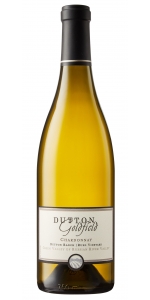Wine from Dutton-Goldfield
Dutton-Goldfield Winery began with a handshake in a vineyard in 1998, when longtime colleagues and friends Steve Dutton and Dan Goldfield recognized a shared vision between them—to craft wines that express the personalities of their cool-climate vineyards, and which they'd enjoy drinking at their own dinner tables.
A fifth-generation farmer, Steve grew up with a love of driving tractors, and without any doubt about his future career. His father, Warren Dutton, had begun growing grapes in the western reaches of Russian River Valley in the mid-1960s, at a time when most people thought the area was too cool to grow fruit for quality still wine. Steve started working with his father when he was five years old, and joined Dutton Ranch full-time in 1987. Today, along with his mother and brother, he manages the family business, which has grown from its original 35-acre home shop vineyard to over 80 separate vineyards comprising more than 1,000 acres throughout western Russian River Valley.
After graduating from Boston's Brandeis University, Dan headed west to begin a career in research chemistry, with a few detours for skiing and hiking on the way. Always an outdoor enthusiast, the life of lab work was quickly replaced with a dream of winemaking when his brother turned him on to the 1969 Burgundies. Dan entered the University of California at Davis, graduating with an M.S. in Enology in 1986. He gained knowledge on the job with stints at Robert Mondavi Winery and Schramsberg as well as winemaking in Portugal for two years. He found his passion in Pinot Noir and Chardonnay, first as the winemaker at the Burgundian-focused La Crema Winery, and then at Hartford Court, which was created under his direction. Dan's appreciation for the beauty of the extraordinary landscape around our home is reflected in his winemaking.
Dutton-Goldfield Rued Vineyard Chardonnay is made from 100 percent Chardonnay.
The nose leads with tangerine, apricot, and kiwi fruit, accented by lemon oil, orange blossom, and hazelnut. In the mouth, the fruit/floral and bright/rich theme continues, with the lychee and Meyer lemon top notes joined by Asian pear and Gravenstein apple, framed with honeysuckle and gardenia.
The dual nature of the wine makes it pair well with both rich and light fare, like lobster roll, roasted pork, or sautéed sole.
Review:
From a clone once called the Chardonnay Musque selection, this wine is highly aromatic and fresh. Juicy tropical fruit and tangerine flavors remain crisp and brilliant, leading to a complex midpalate of Meyer lemon and pear. The finish is topped by lasting, lingering layers of hazelnut.
- Wine Enthusiast 94 Points
- back
Selected Options
Wineries
Categories
Pricing
Countries
Regions
Grape Types
Wineries
Organic/Free Shipping
Deep color of violet and black tones. On the nose, it shows aromas of black tea, violets, blueberries and dark berries. It presents freshness, fine grain tannins and minerality on the palate.
Crown Point Relevant Red is made from 85% Cabernet Sauvignon, 10% Cabernet Franc, 5% Petit Verdot.
The Crown Point Relevant is the introductory wine to Crown Point Vineyards. All estate grown, it showcases incredible freshness and fruit character from their young vines. A large part of the blend is given to Cabernet Sauvignon, which brings spiced tones of cassis, violets, and bay leaves. Cabernet Franc brings a delicate and soft character to this wine and is completed with a touch of Petit Verdot that brings tension and density. The wine was aged in 50% new French oak and 50% used French oak for one year.
Review:
Intensely dark blueberry and cassis aromas are cut by hints of meat and dry oak on the nose of this estate's entry-level bottling, which includes 10% Cabernet Franc and 5% Petite Verdot. Chalky, firm tannins frame the fresh blackberry flavors of the sip, where a dusting of pepper spice floats through the long-lingering finish.
- 95 Points - Wine Enthusiast





